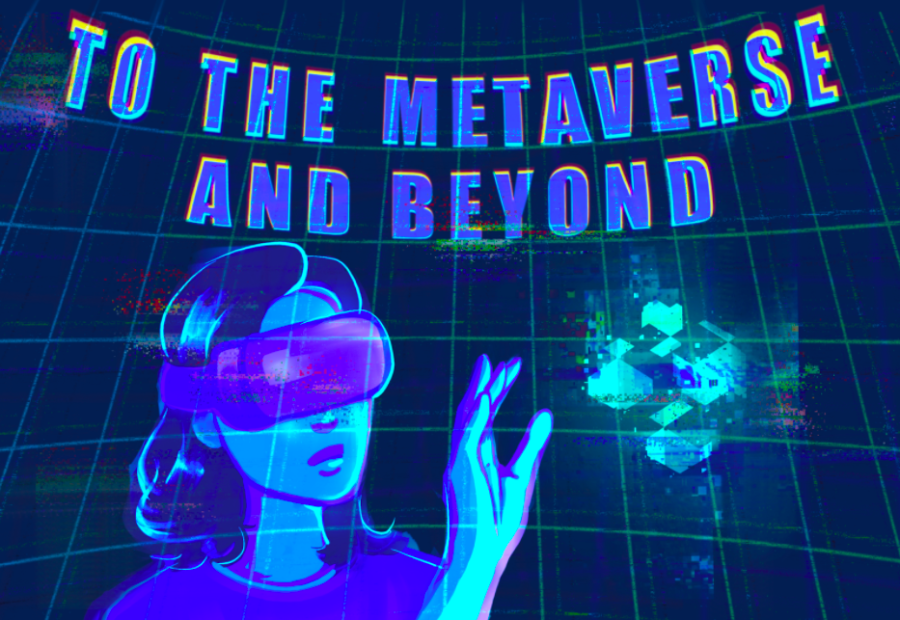To the Metaverse and Beyond!
You may think the term metaverse sounds like something straight out of a science-fiction novel – that’s because it is! The term “metaverse” was coined by author Neal Stephenson in his 1992 novel Snow Crash.
In the last month, the term has been increasingly used in the context of Facebook. On October 28th, the tech giant announced that it would officially change its name and stock ticker to Meta and MVRS, respectively. This change comes suspiciously shortly after one of Facebook’s biggest scandals yet: The Facebook whistleblower case. In short, the case exposed Facebook’s dismissal of internal research revealing that its platform “amplifies hate, misinformation and political unrest” (CBS Whistleblower) The rebranding may effectively deflect attention away from the scandal, but it draws eyes to other issues with Facebook’s plans.
What are Facebook’s plans?
In Mark Zuckerberg’s announcement of “The Metaverse”, he explained Facebook’s shift: “Today we are seen as a social media company, but in our DNA we are a company that builds technology to connect people, and the metaverse is the next frontier just like social networking was when we got started”. The company’s main goals are to provide a space for digital commerce, increase the practicality and use of virtual reality (VR) and to provide jobs for creators and developers. In other words, Facebook is fearful of falling behind technological advances that are taking over. Although the shift seems sudden and unprecedented, Facebook is not the first company to make efforts towards this concept. In fact, companies like Roblox Corporation, Microsoft, Epic Games (the creators of Fortnite) and Dyson have already announced similar plans.
What Is the “Metaverse”?
The term is a fusion of the words “meta” and “universe”. “Meta” is the quality of transcending. In daily conversation it often refers to being extremely and increasingly self-aware, self-referential, and self-reflective.
The metaverse is trying to create a virtual reality hoping to have day-to-day life to function in it completely. In an Inc. Magazine article on the metaverse, the author, Jason Aten, explains that the platform is likely to host school, work, entertainment and gaming in the future. It would be a virtual world in which we can all gather and interact.
If you are thinking that the metaverse includes anything that is part of the new wave of technology, encompassing things from NFTs to VR to gaming and cryptocurrencies, you are right (New York Times). In short, “metaverse” is an umbrella term for the future of technology.
What does this mean for us, the consumers?
Facebook has dealt with multiple challenges, including its alleged involvement in the 2016 US presidential elections, misinformation, and the mentioned whistleblower case. A looming danger is that the company will carry its faults into the metaverse, magnifying their harming impact on the average consumer.
Digital Profiling
It is no secret that social media companies gather user information and adapt the advertising and posts shown accordingly. The 2020 documentary Coded Bias on Netflix discusses integrated bias in algorithms like facial recognition. Frighteningly, research revealed that the digital profiling one undergoes can change the content one is shown even outside of social media. Futurist Amy We explains that “ as a result [of algorithmic determinism] you are paying more or less money for toilet paper when you shop online. You are being shown better or worse mortgages. You are more or less likely to be profiled as a criminal.” This digital profiling will not stop when Facebook starts up metaverse. It is alarming that a company working for profit will have essentially the same power a government has over private lives.
Content Regulation, Misinformation and Polarization
Facebook does not have a friendly history with misinformation and content regulation on their platform. The “reality block” mechanism, by which social media sites exclude content one may not like, creates echo chambers. There is no doubt that political polarization in the USA is connected to this. Only recently has Facebook ramped up efforts for regulation of hate speech and misinformation. Content regulation is something they still struggle with.
Both of these issues, polarization and misinformation, will be magnified if or when the world starts operating through the metaverse. Louis Rosenberg, who worked in AR development for 30 years, predicts that “Instead of us just kind of being in our own information bubbles, we’re going to be segmented into our own custom realities,” creating further disconnect in the population (Business Insider).
Mental Health
At this point, we have become increasingly aware of the damages social media can have on one’s mental health, especially on teenagers. According to a New York Times article by John Herrman, the metaverse will only further capitalize off of consumers’ Fear of Missing Out (FOMO). As the metaverse plans to be a much more fundamental, integral part to our lives, lack of access or usage will entail much larger FOMO in users. Yet another issue that would have a detrimental impact if carried into the future reality of technology.
The metaverse, or at least what we imagine it to be, will arrive whether one likes it or not. It will revolutionize our lives in unexpected ways, bringing with it many amazing, new possibilities. However, as everything stands right now, the companies and their regulations are not fit for creating one aimed at benefiting the public. In any event, with the right laws and regulations, the metaverse could have the potential to be very positive in our lives. It is a revolution looming around the corner. So, on we go… to the metaverse and beyond!

Jade-Sophie, an IB senior, is excited to be returning to the Banner as a Science and Tech editor this year. It is her second year writing and she can’t...



